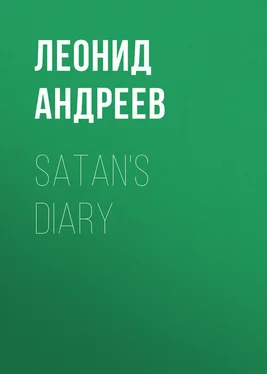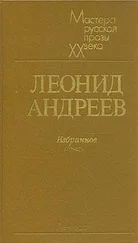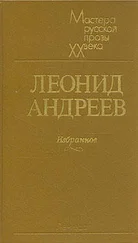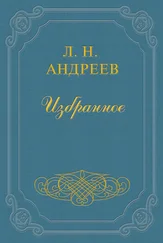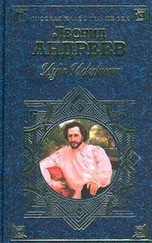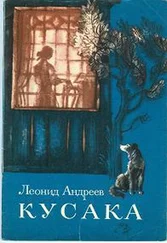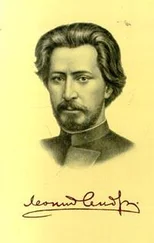Леонид Андреев - Satan's Diary
Здесь есть возможность читать онлайн «Леонид Андреев - Satan's Diary» — ознакомительный отрывок электронной книги совершенно бесплатно, а после прочтения отрывка купить полную версию. В некоторых случаях можно слушать аудио, скачать через торрент в формате fb2 и присутствует краткое содержание. Издательство: Иностранный паблик, Жанр: Русская классическая проза, Старинная литература, literature_19, foreign_language, на английском языке. Описание произведения, (предисловие) а так же отзывы посетителей доступны на портале библиотеки ЛибКат.
- Название:Satan's Diary
- Автор:
- Издательство:Иностранный паблик
- Жанр:
- Год:неизвестен
- ISBN:нет данных
- Рейтинг книги:3 / 5. Голосов: 1
-
Избранное:Добавить в избранное
- Отзывы:
-
Ваша оценка:
- 60
- 1
- 2
- 3
- 4
- 5
Satan's Diary: краткое содержание, описание и аннотация
Предлагаем к чтению аннотацию, описание, краткое содержание или предисловие (зависит от того, что написал сам автор книги «Satan's Diary»). Если вы не нашли необходимую информацию о книге — напишите в комментариях, мы постараемся отыскать её.
Satan's Diary — читать онлайн ознакомительный отрывок
Ниже представлен текст книги, разбитый по страницам. Система сохранения места последней прочитанной страницы, позволяет с удобством читать онлайн бесплатно книгу «Satan's Diary», без необходимости каждый раз заново искать на чём Вы остановились. Поставьте закладку, и сможете в любой момент перейти на страницу, на которой закончили чтение.
Интервал:
Закладка:
“My son is out rowing with his wife in the Gulf of Finland,” Andreyev’s mother told me. “They will be back in half an hour.”
As I waited I watched the seething activity everywhere on Andreyev’s estate. In Yasnaya Polyana, the home of Count Tolstoy, everything seemed long established, fixed, well-regulated, serenely beautiful. Andreyev’s estate was astir with vigorous life. Young, strong men were building the House of Man. More than thirty of them were working on the roof and in the yard, and a little distance away, in the meadows, young women and girls, bright-eyed and red faced, were haying. Youth, strength, vigor everywhere, and above all the ringing laughter of little children at play. I could see from the window the “Black Little River,” which sparkled in the sun hundreds of feet below. The constant noise of the workmen’s axes and hammers was so loud that I did not notice when Leonid Andreyev entered the room where I was waiting for him.
“Pardon my manner of dressing,” he said, as we shook hands. “In the summer I lead a lazy life, and do not write a line. I am afraid I am forgetting even to sign my name.”
I had seen numerous photographs of Leonid Andreyev, but he did not look like any of them. Instead of a pale-faced, sickly-looking young man, there stood before me a strong, handsome, well-built man, with wonderful eyes. He wore a grayish blouse, black, wide pantaloons up to his knees, and no shoes or stockings.
We soon spoke of Russian literature at the time, particularly of the drama.
“We have no real drama in Russia,” said Andreyev. “Russia has not yet produced anything that could justly be called a great drama. Perhaps ‘The Storm,’ by Ostrovsky, is the only Russian play that may be classed as a drama. Tolstoy’s plays cannot be placed in this category. Of the later writers, Anton Chekhov came nearest to giving real dramas to Russia, but, unfortunately, he was taken from us in the prime of his life.”
“What do you consider your own ‘Life of Man’ and ‘To the Stars’?” I asked.
“They are not dramas; they are merely presentations in so many acts,” answered Andreyev, and, after some hesitation, added: “I have not written any dramas, but it is possible that I will write one.” At this point Andreyev’s wife came in, dressed in a Russian blouse. The conversation turned to America, and to the treatment accorded to Maxim Gorky in New York.
“When I was a child I loved America,” remarked Andreyev. “Perhaps Cooper and Mayne Reid, my favorite authors in my childhood days, were responsible for this. I was always planning to run away to America. I am anxious even now to visit America, but I am afraid – I may get as bad a reception as my friend Gorky got.”
He laughed as he glanced at his wife. After a brief pause, he said:
“The most remarkable thing about the Gorky incident is that while in his stories and articles about America Gorky wrote nothing but the very worst that could be said about that country he never told me anything but the very best about America. Some day he will probably describe his impressions of America as he related them to me.”
It was a very warm day. The sun was burning mercilessly in the large room. Mme. Andreyev suggested that it would be more pleasant to go down to a shady place near the Black Little River.
On the way down the hill Andreyev inquired about Tolstoy’s health and was eager to know his views on contemporary matters.
“If Tolstoy were young now he would have been with us,” he said.
We stepped into a boat, Mme. Andreyev took up the oars and began to row. We resumed our conversation.
“The decadent movement in Russian literature,” said Andreyev, “started to make itself felt about ten or fifteen years ago. At first it was looked upon as mere child’s play, as a curiosity. Now it is regarded more seriously. Although I do not belong to that school, I do not consider it worthless. The fault with it is that it has but few talented people in its ranks, and these few direct the criticism of the decadent school. They are the writers and also the critics. And they praise whatever they write. Of the younger men, Alexander Blok is perhaps the most gifted. But in Russia our clothes change quickly nowadays, and it is hard to tell what the future will tell us – in our literature and our life.
“How do I picture to myself this future?” continued Andreyev, in answer to a question of mine. “I cannot know even the fate and future of my own child; how can I foretell the future of such a great country as Russia? But I believe that the Russian people have a great future before them – in life and in literature – for they are a great people, rich in talents, kind and freedom-loving. Savage as yet, it is true, very ignorant, but on the whole they do not differ so much from other European nations.”
Suddenly the author of “Red Laughter” looked upon me intently, and asked: “How is it that the European and the American press has ceased to interest itself in our struggle for emancipation? Is it possible that the reaction in Russia appeals to them more than our people’s yearnings for freedom, simply because the reaction happens to be stronger at the present time? In that event, they are probably sympathizing with the Shah of Persia! Russia to-day is a lunatic asylum. The people who are hanged are not the people who should be hanged. Everywhere else honest people are at large and only criminals are in prison. In Russia the honest people are in prison and the criminals are at large. The Russian Government is composed of a band of criminals, and Nicholas II is not the greatest of them. There are still greater ones. I do not hold that the Russian Government alone is guilty of these horrors. The European nations and the Americans are just as much to blame, for they look on in silence while the most despicable crimes are committed. The murderer usually has at least courage, while he who looks on silently when murder is committed is a contemptible weakling. England and France, who have become so friendly to our Government, are surely watching with compassion the poor Shah, who hangs the constitutional leaders. Perhaps I do not know international law. Perhaps I am not speaking as a practical man. One nation must not interfere with the internal affairs of another nation. But why do they interfere with our movement for freedom? France helped the Russian Government in its war against the people by giving money to Russia. Germany also helped – secretly. In well-regulated countries each individual must behave decently. When a man murders, robs, dishonors women he is thrown into prison. But when the Russian Government is murdering helpless men and women and children the other Governments look on indifferently. And yet they speak of God. If this had happened in the Middle Ages a crusade would have been started by civilized peoples who would have marched to Russia to free the women and the children from the claws of the Government.”
Andreyev became silent. His wife kept rowing for some time slowly, without saying a word. We soon reached the shore and returned silently to the house. That was twelve years ago.
I met him several times after that. The last time I visited him in Petrograd during the July riots in 1917.
A literary friend thus describes the funeral of Leonid Andreyev, which gives a picture of the tragedy of Russia:
“In the morning a decision had to be reached as to the day of the funeral. It was necessary to see to the purchase and the delivery of the coffin from Viborg, and to undertake all those unavoidable, hard duties which are so painful to the family.
“It appeared that the Russian exiles living in our village had no permits from the Finnish Government to go to Viborg, nor the money for that expense. It further appeared that the family of Leonid Andreyev had left at their disposal only one hundred marks (about 6 dollars), which the doctor who had come from the station after Andreyev’s death declined to take from the widow for his visit.
Читать дальшеИнтервал:
Закладка:
Похожие книги на «Satan's Diary»
Представляем Вашему вниманию похожие книги на «Satan's Diary» списком для выбора. Мы отобрали схожую по названию и смыслу литературу в надежде предоставить читателям больше вариантов отыскать новые, интересные, ещё непрочитанные произведения.
Обсуждение, отзывы о книге «Satan's Diary» и просто собственные мнения читателей. Оставьте ваши комментарии, напишите, что Вы думаете о произведении, его смысле или главных героях. Укажите что конкретно понравилось, а что нет, и почему Вы так считаете.
